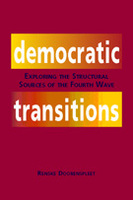
With the widespread movement toward democratization that characterized the first post-Cold War decade, why did some nondemocratic regimes undergo a transition toward a democratic political system, but others not? Why have some transitions succeeded completely, but others resulted in only limited political reform? Renske Doorenspleet addresses these questions, providing a systematic theoretical and empirical analysis of variations in transitions to democracy.
REVIEWS
Doorenspleet interweaves a discussion of key concepts, the major theoretical approaches to democratization, and statistical analyses to illuminate the influence of structural primarily economic and social factors on democratic transitions. She also explores the notion of “waves” of democratization. Though focusing on the 1989-2001 period, she offers a wealth of new evidence covering two centuries of democratic transitions around the globe.
“Democratic Transitions … is all the more stimulating because it challenges common thinking about democracy and democratization and forces readers to consider new positions and arguments…. Indeed, [it] is a must-read for researchers interested in comparative democratization, and it will very likely influence and spur additional research on democratic transitions.”
—Kristian Skrede Gleditsch, in International Studies Review
“This thoughtful, well-structured, and well-argued work makes an intriguing contribution…. Doorenspleet measures waves of democracy in original and insightful ways.”
— Andreas Schedler, CIDE
